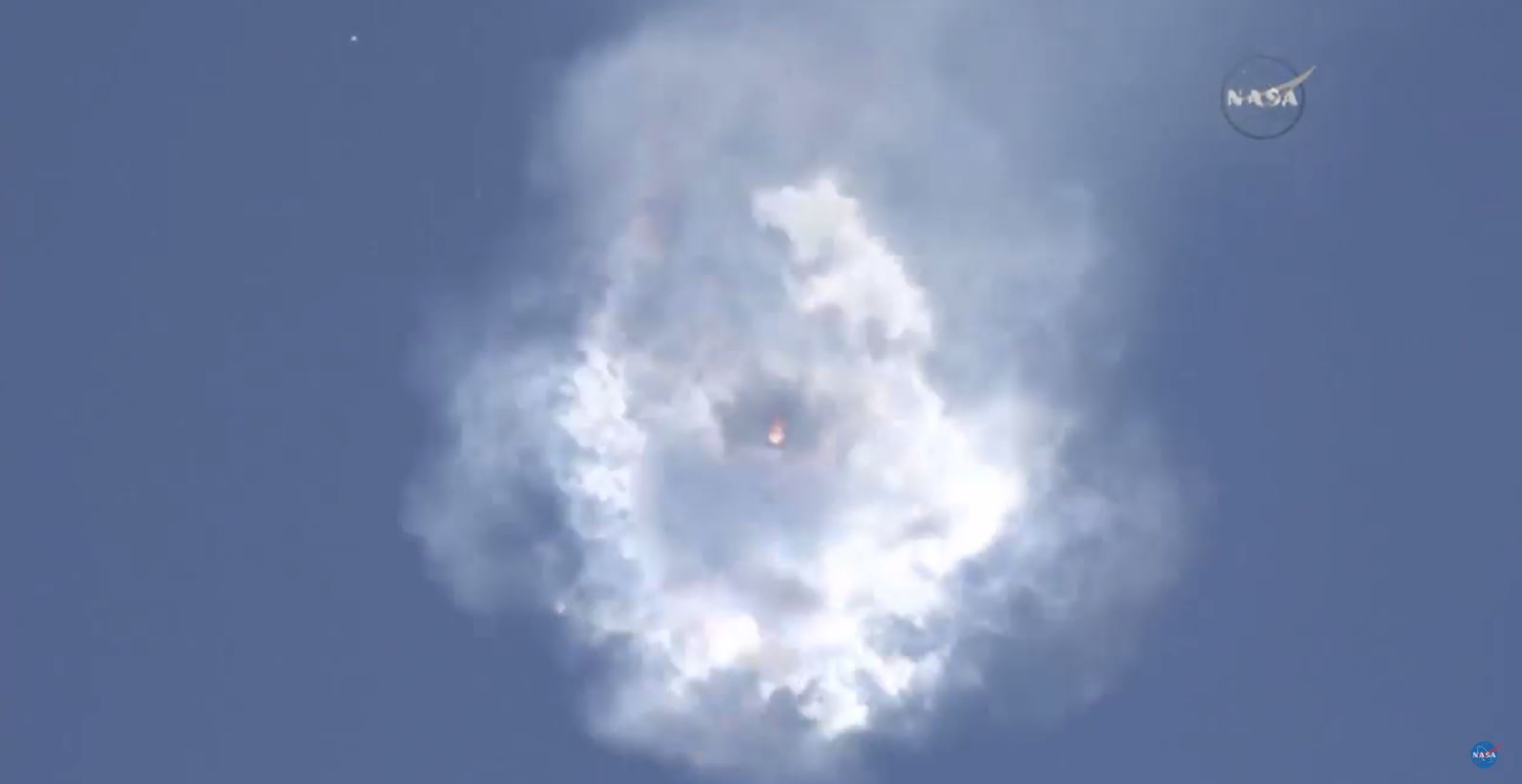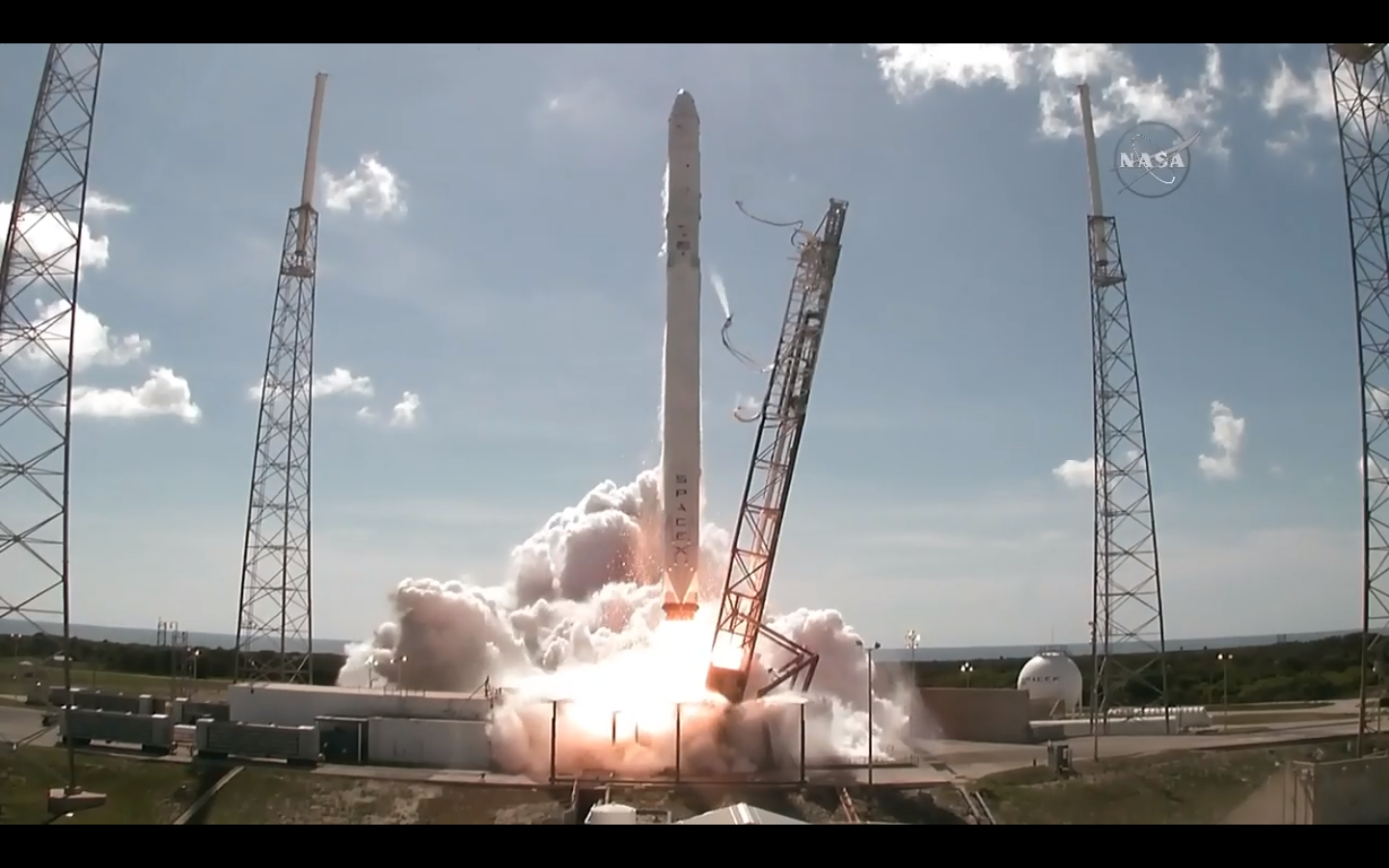SpaceX Rocket Explodes During Cargo Launch to Space Station

An unmanned SpaceX cargo mission crashed back to Earth today (June 28), marking the third failure of a resupply flight to the International Space Station in the past eight months.
SpaceX's robotic Dragon capsule blasted off atop the company's two-stage Falcon 9 rocket as planned today at 10:21 a.m. EDT (1421 GMT) from Florida's Cape Canaveral Air Force Station, headed for the orbiting lab. But something went wrong about two minutes into the flight, and the rocket broke apart, raining debris out of the sky.
"There was an overpressure event in the upper stage liquid oxygen tank. Data suggests counterintuitive cause," SpaceX founder and CEO Elon Musk said via Twitter today, which is, incidentally, his 44th birthday. "That's all we can say with confidence right now. Will have more to say following a thorough fault tree analysis." [See photos from the SpaceX cargo launch]
SpaceX holds a $1.6 billion NASA contract to fly at least 12 unmanned supply runs to the space station. Today's liftoff kicked off mission number seven; the previous six flights had all been successful.
Dragon was carrying more than 4,000 lbs. (1,814 kilograms) of food, supplies and scientific experiments. The scientific gear included high-resolution cameras designed to observe and study meteors as they plow into Earth's atmosphere, as well as equipment that would have helped researchers better understand which microbes are present inside the space station, and how these organisms change and adapt over time.
Today's accident follows closely on the heels of two other cargo-mission failures. Orbital ATK's Antares rocket exploded shortly after liftoff this past October, scuttling the company's third robotic cargo mission. (Orbital ATK holds a $1.9 billion deal with NASA to make eight supply flights using Antares and its Cygnus spacecraft.)
And Russia's unmanned Progress 59 vessel fell back to Earth in May without reaching the space station, apparently done in by a problem with the third stage of the Soyuz rocket that launched it to space.
Breaking space news, the latest updates on rocket launches, skywatching events and more!
Despite this recent run of setbacks, the International Space Station (ISS) remains well-provisioned into the fall, NASA officials said.
"We're good to the October timeframe if no other vehicles show up," NASA ISS program manager Mike Suffredini said during a prelaunch press conference Friday (June 26). If Dragon had made it, the $100 billion orbiting complex would have been well-stocked through the end of the year, he added.
The next Progress freighter is due to launch July 3 from Baikonur Cosmodrome in Kazakhstan.
SpaceX had also aimed to land the Falcon 9's first stage on an "autonomous spaceport drone ship" during today's launch, in a test of reusable-rocket technology. The company is trying to develop fully and rapidly reusable rockets, in order to slash the cost of spaceflight.
"A jumbo jet costs about the same as one of our Falcon 9 rockets, but airlines don't junk a plane after a one-way trip from LA to New York," SpaceX representatives wrote Thursday (June 25) about the company's reusable-rocket goals. "Yet when it comes to space travel, rockets fly only once — even though the rocket itself represents the majority of launch cost."
SpaceX had tried the rocket landing on the previous two Dragon launches, and nearly succeeded both times: The rocket stage hit the boat but came down too hard, toppling over and exploding on the deck.
Today's rocket failure nixed attempt number three, obviously.
Follow Mike Wall on Twitter @michaeldwall and Google+. Follow us @Spacedotcom, Facebook or Google+. Originally published on Space.com.

Michael Wall is a Senior Space Writer with Space.com and joined the team in 2010. He primarily covers exoplanets, spaceflight and military space, but has been known to dabble in the space art beat. His book about the search for alien life, "Out There," was published on Nov. 13, 2018. Before becoming a science writer, Michael worked as a herpetologist and wildlife biologist. He has a Ph.D. in evolutionary biology from the University of Sydney, Australia, a bachelor's degree from the University of Arizona, and a graduate certificate in science writing from the University of California, Santa Cruz. To find out what his latest project is, you can follow Michael on Twitter.

